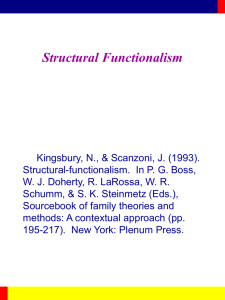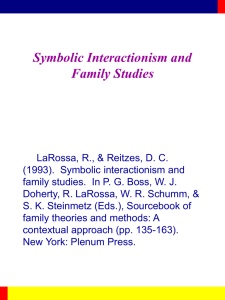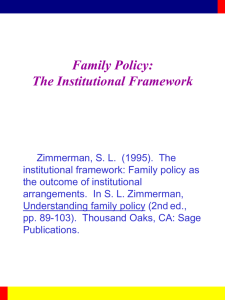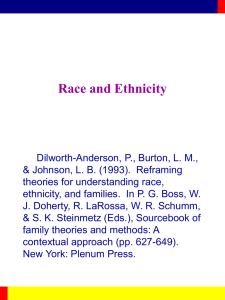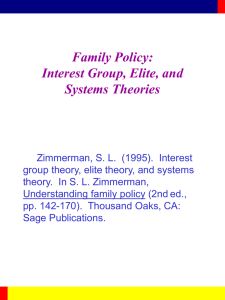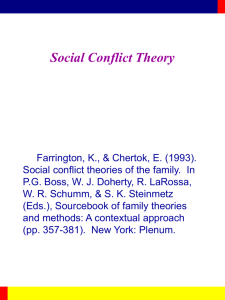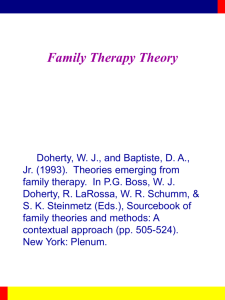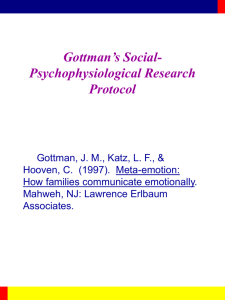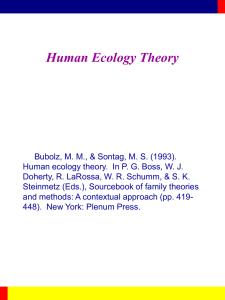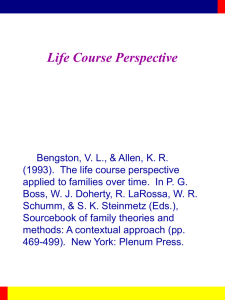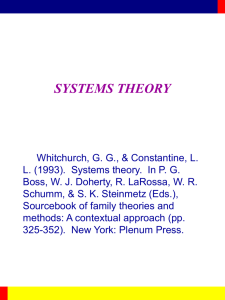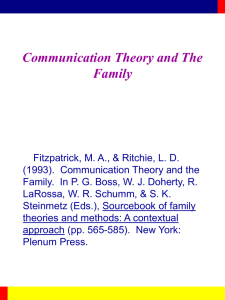Developmental Psychology
advertisement
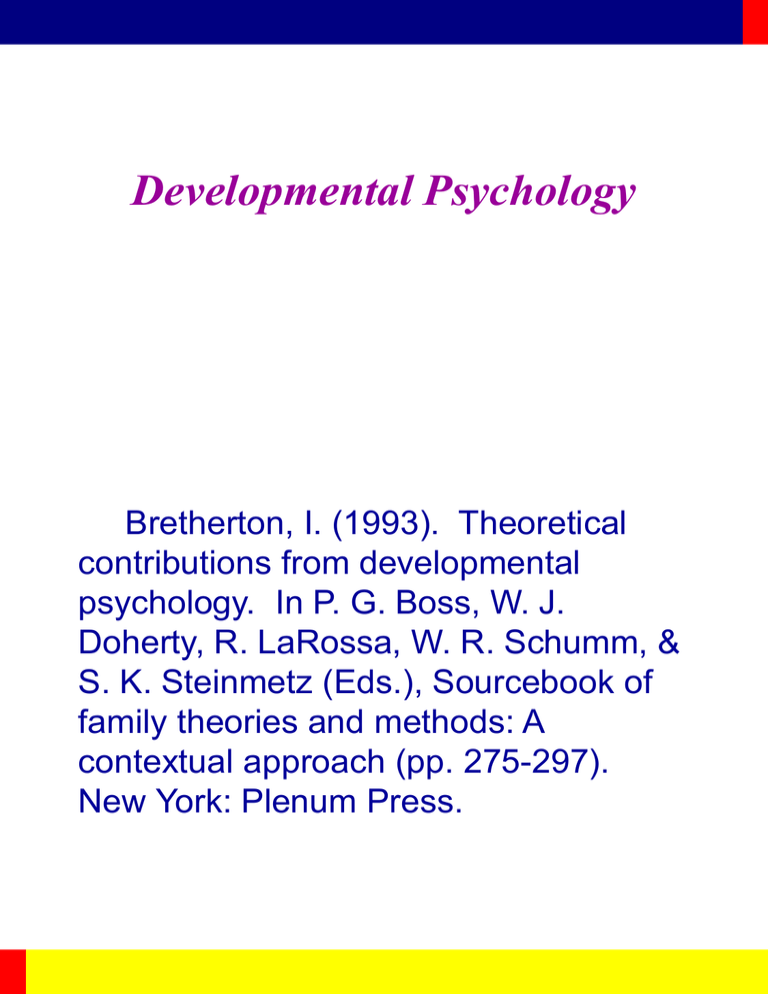
Developmental Psychology Bretherton, I. (1993). Theoretical contributions from developmental psychology. In P. G. Boss, W. J. Doherty, R. LaRossa, W. R. Schumm, & S. K. Steinmetz (Eds.), Sourcebook of family theories and methods: A contextual approach (pp. 275-297). New York: Plenum Press. Contributions from Developmental Psychology James Mark Baldwin: Social relationships, particularly those with parents and siblings, influence human development. Multiple social selves: one person has different social selves which are developed in different social relationships. New experiences are understood in terms of old experiences. To become a full member of society, people must develop shared social representations of the world. Impact of different relationships: Authority figures such as parents contribute to new learning. Relationships with peers allow the child to practice already-known skills. Dr. Ronald J. Werner-Wilson Contributions from Dev. Psychology (cont.) James B. Watson: A behaviorist who suggested that humans should only be studied by observing their behaviors. Parenting should be a science based on conditioning principles. Arnold Gessell: studied the bi-directional influence of the parent-child dyad. Lewin: also studied bi-directional influence between parent and child, but noted that environment strongly influenced development. Dr. Ronald J. Werner-Wilson Contributions from Psychoanalytic Theories Object relations theory suggests that relatedness to others is the most basic need. Capacity for close interpersonal relationships is influenced by type of care an infant receives (e.g., tender versus anxious) (Sullivan, 1953). The “good enough parent” (based on Winnicott, 1958): Provides a “holding environment” so that an infant can become organized as a person. Two roles of this parent which allow an infant to become attuned to her/his own bodily impulses: Appropriate and prompt response to child’s needs results in a sense of efficacy. Place limited demands on the child when not needed so that the infant develops a capacity for aloneness which is central to a stable self. Dr. Ronald J. Werner-Wilson Contributions from Psychoanalytic Theories (cont.) Erikson suggested eight major dilemmas that are universally experienced: Basic trust versus mistrust (infancy). Autonomy versus shame and doubt (early childhood). Initiative versus guilt (childhood). Industry versus inferiority (early adolescence). Identity versus role confusion (adolescence). Intimacy versus isolation (youth). Generativity (being productive -- ambition) versus stagnation (adulthood). Integrity versus despair (old age). Dr. Ronald J. Werner-Wilson Assumptions The parent-child relationship plays a crucial role in the development of a sense of self and the capacity for relatedness to others. Patterns of social interaction with parents are internalized . . . [which] affect a person’s capacity for close relationships outside the family. Parental input operates through the child’s ability to process it. Cultural values of the elder generation affect the patterning of the parent-child relationship. Generativity, or the need to nurture, is a critical phase in adult development. Dr. Ronald J. Werner-Wilson Attachment Theory Postulate: the human infant is preadapted to respond to it’s caregiver. Evolutionary function: attachment behaviors promote close proximity to the caregiver so that the child can be protected from danger. Type of attachment is influenced by caregiving; children can be categorized as: Secure. Ambivalent (e.g., seek comfort but show anger or resistance) Avoidant. Insecure-disorganized: difficult to classify in one of the preceding categories. Dr. Ronald J. Werner-Wilson The Ecological Theory of Human Development Two important points: It is important to study human development in it’s broader context. Research should have ecological validity: “the environment experienced by the subjects in a scientific investigation [should] have the properties it is supposed or assumed to have by the investigator” (Bronfenbrenner, 1979, p. 29; quoted in Bretherton, 1993, p. 286). Structure of the environment influences development. There are four systems: Microsystem Mesosystem Exosystem Macrosystem Dr. Ronald J. Werner-Wilson The Ecological Theory of Human Development (cont.) Microsystem: Face-to-face experiences which feature a pattern of activities, roles, and interpersonal relations The experiences occur with people who have distinctive characteristics of temperament, personality, and systems of personal belief. Mesosystem: A system of microsystems. The linkage and processed between important settings (e.g., home and daycare or school). Exosystem: Two or more settings, but one does not include the child (e.g., parent’s employment). There is still a direct effect on the child. Dr. Ronald J. Werner-Wilson The Ecological Theory of Human Development (cont.) Macrosystem: the social blueprint for a particular culture which influence through a variety of internal and external processes, including belief systems, resources, hazards, life styles, opportunity structures, life course options, patterns of social interchange. Dr. Ronald J. Werner-Wilson Example of a Contextual Study Variables: Exosystem: retrospective evaluation of relationship to parents and social support. Microsystem: observation of parent-child interactions and measurement of individual qualities. Findings: Negative change in marital satisfaction after the birth of the child predicted attachment. When all factors functioned in a positive, supportive mode, attachment was secure. Exosystem: mother’s of securely attached children reported having more ego strength and interpersonal affection. Dr. Ronald J. Werner-Wilson
